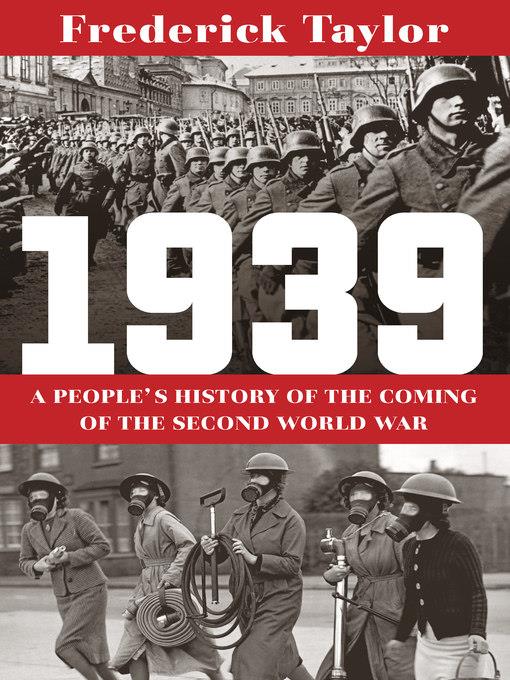
1939
A People's History of the Coming of the Second World War
کتاب های مرتبط
- اطلاعات
- نقد و بررسی
- دیدگاه کاربران
نقد و بررسی

February 15, 2020
A history of the lead-up to World War II mostly from the point of view of Britain and Germany. Despite the title, British historian Taylor, author of Dresden (2004), The Berlin Wall (2007), and other works of European history, covers the period from the October 1938 Munich Agreement through Germany's invasion of Poland the following September. At their most loathsome during that year, Hitler and the Nazis achieved triumph after triumph against a dithering Britain and France. Cutting away regularly, the author uses diaries, letters, newspapers, surveys, and police reports to deliver a vivid account of how ordinary Britons and Germans reacted. Excepting many intellectuals and a few government officials, the average non-Jewish German admired Hitler. There was almost no unemployment despite a standard of living far below that in Britain and France, and the incessant patriotic cheerleading pleased almost everyone. Germans did not, however, want war, as Taylor clearly demonstrates. They liked the idea of acquiring more territory, but when Hitler promised to invade Czechoslovakia if it did not give up the Sudetenland, the absence of national enthusiasm disgusted him. As a result, in the summer before the war, Hitler's propaganda machine poured out so much fake news denouncing Polish malevolence, depravity, and atrocities against its German minority that most felt invasion was justified. However, Britons wanted war even less than Germans, so much so that the Munich Pact produced almost universal cheers throughout the nation--although "once the initial joy at the avoidance of war had worn off there was a slow but steady growth of buyer's remorse among many members of the general public." This sentiment peaked in March 1939 when German troops occupied the remainder of Czechoslovakia. At this point, most Britons agreed that Hitler was untrustworthy, and few objected when Britain and Poland signed a treaty that "guaranteed Polish independence." That vague phrasing was easy to brush off, so Britain's declaration of war after the invasion of Poland dismayed Germans from Hitler on down. For World War II buffs, an illuminating study of a depressing year.
COPYRIGHT(2020) Kirkus Reviews, ALL RIGHTS RESERVED.

March 1, 2020
The subtitle is a bit misleading. Rather than writing a true people's history, Taylor (Dresden) provides a straightforward narrative of how World War II started from the perspectives of the major players in Great Britain and Germany such as former British Prime Minister Neville Chamberlain, and German leaders Adolf Hitler and Joseph Goebbels. Taylor touches on some aspects of daily life in those countries as well as other news that was overlooked and forgotten because of the momentous events of 1938 and 1939. In addition, Taylor sprinkles in diary entries from the time as well as personal interviews he conducted with people who were children in 1939. He gives some attention to the issue of propaganda and how the German and British governments managed public opinion and encouraged their populations to fight. Taylor also recounts how atrocities committed against ethnic Germans were used by the Nazi regime to justify its aggression. VERDICT Written in an accessible, engaging style, this book will appeal most to casual readers of popular history. [See Prepub Alert, 11/4/19.]--Michael Farrell, Reformed Theological Seminary, Orlando, FL
Copyright 2020 Library Journal, LLC Used with permission.

March 30, 2020
British historian Taylor (Coventry) delivers an incisive survey of “the experience of the people living day by day, week by week, through the chaotic and unpredictable time immediately preceding the outbreak of the Second World War.” Juxtaposing British and German perspectives, Taylor chronicles the year between the 1938 Munich Agreement and the 1939 invasion of Poland, drawing on personal diaries, published memoirs, newspaper accounts, and oral histories to examine how “the mass of the people” in both countries went from not wanting war to tolerating it with “grim determination.” British prime minister Neville Chamberlain, Taylor shows, at first received “almost unanimous” praise from the press for his appeasement policy, but “hardly anyone” thought Hitler would stop with annexing the Sudeten territories of Czechoslovakia. Following Kristallnacht in November 1938, ordinary Britons saw the Nazi regime as “barbaric” and “guided by unhinged personalities,” but remained largely ambivalent about Jewish refugees. In Germany, meanwhile, propaganda minister Joseph Goebbels waged a yearlong disinformation campaign that convinced even some German Jews to support the invasion of Poland. Taylor’s research impresses, though the granularity of detail may daunt all but the most dedicated of readers, and a through line about German serial killer Johann Eichhorn seems out of place. This exhaustive deep-dive offers fresh insights into how WWII happened.

























دیدگاه کاربران